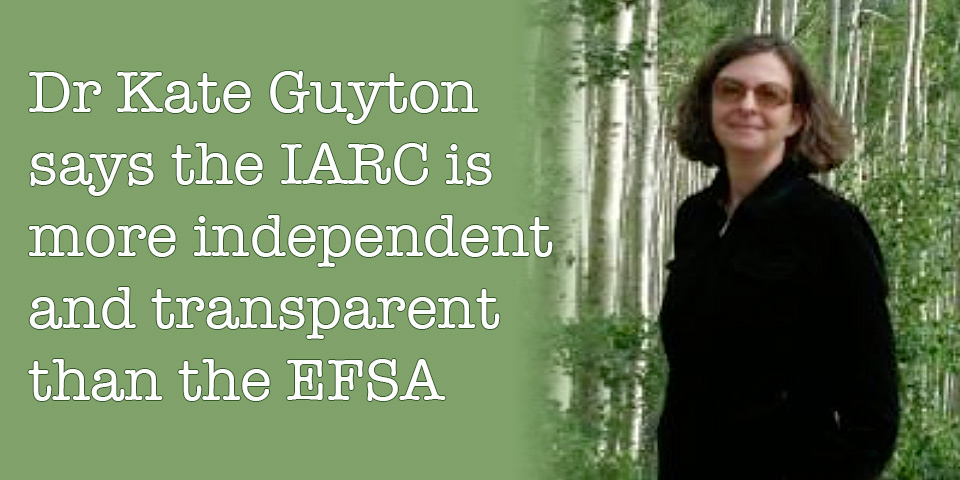
Dr Kate Guyton says IARC more independent and transparent than EFSA
Dr Kate Guyton, the senior toxicologist who worked on the International Agency for Cancer Research (IARC) report that classified glyphosate as a carcinogen, has explained why the IARC report came to a different conclusion to the European Food Safety Authority (EFSA). EFSA recently said the chemical was not likely to be carcinogenic.
In a radio interview with BBC Farming Today, Guyton defended the methods used by IARC. She said IARC had conducted "the most independent, rigorous and transparent evaluation”, based on “rigorous scientific criteria” that were openly published in a preamble to the report. She added that the evaluation was performed by the “world’s leading experts”.
Guyton said the main difference between the two reports was that IARC had only used studies that were publicly available for independent scientific review”, which is “extremely important for independence and transparency”. EFSA included other studies that were not published and that IARC were not able to review.
In fact, Guyton is referring to industry-sponsored studies that are kept hidden from the public under commercial confidentiality rules. EFSA’s evaluation relied heavily on these industry studies.
Quite apart from the bias inherent in secret industry-sponsored studies, many were done according to outdated methods.
Guyton was asked whether the IARC report was worrying people unnecessarily about a
risk which was only theoretical, given the low levels at which the chemical was actually used in the real world. Guyton replied, “Our evaluation is based on studies of people who were exposed in their work, so these are real-world exposures, and in those studies there was evidence of cancer being caused. So I don’t think that’s a valid criticism.”
The BBC interviewer said that with two respected bodies like the IARC and EFSA disagreeing, it was hard for the public to know who to believe. Guyton replied, “Our evaluation was done according to the strictest international standards. Our review was reviewed by Germany as part of the EFSA process and they affirmed our conclusions according to our criteria.
EFSA report not independent
Pesticide Action Network (PAN) Europe criticised EFSA's report as not independent, but “a copy of the German government agency BfR’s assessment and the pesticide industry dossier” compiled by the industry-funded Glyphosate Task Force.
PAN accused the GTF of "hiding and misinterpreting tumour incidences from experimental studies".
The contradiction between IARC’s report and the German government’s report on glyphosate classification was examined by toxicologist Dr Peter Clausing for PAN Germany. Clausing detected major flaws in the assessment of glyphosate by BfR.
In his critical review, Clausing highlighted that even without considering independent academic literature, significant tumour incidences were found in five mice studies and at least two rat studies of the regulatory animal experiments produced by the industry.
According to PAN Europe, unlike the IARC and in violation of OECD standards for interpreting carcinogenicity studies, BfR and EFSA considered these tumour incidences as irrelevant to glyphosate exposure, by:
i) cheating on the use of the “control” groups
ii) overlooking statistically significant results
iii) considering cancer incidences in human epidemiology studies as inconsistent and
iv) dismissing genotoxicity (DNA damage) data as irrelevant due to the lack of carcinogenic effects.
PAN Europe’s chemicals officer Hans Muilerman commented, “It is unacceptable that EFSA decided to dismiss the scientific evidence showing the potential of glyphosate to cause cancer and genotoxicity, putting at risk human health and the environment.”
Report: Claire Robinson









